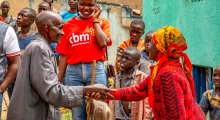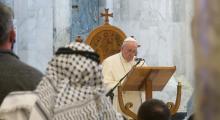Issued by the Catholic Center for Studies and Media - Jordan. Editor-in-chief Fr. Rif'at Bader - موقع أبونا abouna.org

Fr. Jacques Yaro Zerbo, a Malian-born Catholic Priest who has been serving in Burkina Faso’s Dédougou Diocese, has been murdered, the Local Ordinary of the Burkinabe Diocese has confirmed in a statement.
In the statement issued Tuesday, January 3, Bishop Prosper Bonaventure Ky announces with “deep sorrow” the death of Fr. Zerbo, adding that the late Catholic Priest “was killed on Monday, January 2, 2023, by unidentified armed men” in Soro, Northwestern Burkina Faso.
The killers of the Catholic Priest also took his vehicle, multiple sources in the West African nation have reported.
The Priest was captured on January 3 by the armed individuals who executed him, a local security official has been quoted as saying, and added that terrorist attacks are very frequent in the area where Fr. Zerbo was murdered.
Born in December 1956 in Kolongo, Mali, the late Fr. Zerbo was ordained a Priest in July 1986 for Dédougou Diocese. He founded a youth re-education center in the Tougan region, which he later had to relocate to Moundasso (Dédougou) because of terrorist attacks.
The late Catholic priest was also in charge of the Diocesan Commission for the follow-up of the cause of beatification of Dii Alfred Diban KI-ZERBO.
“May the Lord in his infinite mercy welcome his servant into his eternal rest,” Bishop Bonaventure Ky implores in his statement issued January 3.
For close to a decade, Burkina Faso, a nation of some 21 million people in West Africa, has reportedly been “a hotbed of violent extremism and lawlessness since chaos engulfed Libya in 2011, the Islamist takeover of northern Mali in 2012 and the rise of Boko Haram in northern Nigeria.”
About 61 per cent of Burkina Faso residents identify as Muslim and 23 per cent identify as Christian. Several major extremist groups, affiliated with Al-Qaeda and ISIS, are active in the West African country.
Insecurity in Burkina Faso has displaced 1.7 million people and led to significant jumps in humanitarian needs and food insecurity, according to CIA World Factbook.







